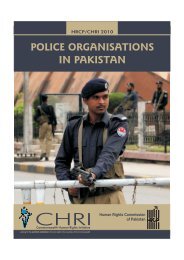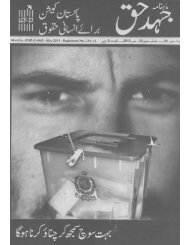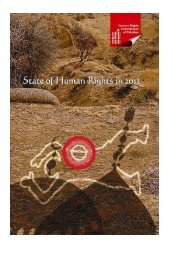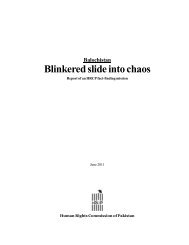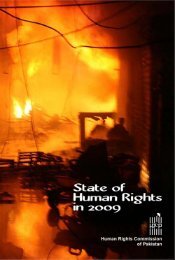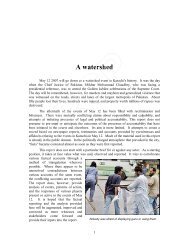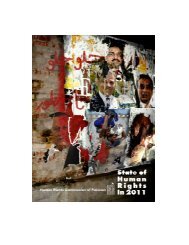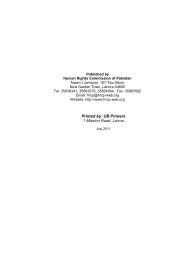Introduction 9direction <strong>of</strong> the Magistrate.22 Police Performance in Post Police Order Context, supra note 6.23 Comments made by I. A. Rehman (Secretary General <strong>Human</strong> <strong>Rights</strong> <strong>Commission</strong> <strong>of</strong> <strong>Pakistan</strong>) at “Police Reform in<strong>Pakistan</strong>: Beyond Analysis”, a Joint CHRI-HRCP Consultation, Lahore, 28 November 2008 attached as Annex - B withthe Police Order, 2002 (Chapter 2)24 Code <strong>of</strong> Criminal Procedure (Amendment) Ordinance, 2001 dated 13 th August, 2001 amended the Cr PC in the light <strong>of</strong> thedecision to abolish district magistrate’s <strong>of</strong>fice to devolve powers to local governments. Similarly, the Police (Amendment)Order (Chief Executive’s Order 7 <strong>of</strong> 2001) dated 13 th August, 2001 removed references to the District Magistrate andtransferred most <strong>of</strong> the powers to the police.25 The preamble envisaged the police to become an institution which would be publicly accountable, pr<strong>of</strong>essionallyefficient, democratically controlled and responsive to the needs <strong>of</strong> the community. Articles 3, 4 and 5 <strong>of</strong> the PoliceOrder, 2002 dealt exclusively with attitudes, duties and responsibilities <strong>of</strong> the police towards the public. Public oversightmechanisms were introduced at the district level by establishing public safety commissions, and Zila Nazim (a termcoined as equivalent <strong>of</strong> mayor in Urdu), elected at the district level (under the powers devolved to the local governmentsestablished in 2001), was given powers to oversee the police.26 “Since law and order issues are better dealt with at the local level, policing is therefore a provincial responsibility. Thereis a general understanding and consensus that police legislation is a provincial subject and it is at the provincial levelthat legislation on police needs to be passed”, see Jamal, supra note 18, for constitutional status <strong>of</strong> police laws at pp.8-9 and footnotes 4 to 11 at pp. 64-65. Also see International Crisis Group Asia Report No. 157, Reforming <strong>Pakistan</strong>’sPolice, 14 July 2008 at page 6.27 It may also be noted that since the local bodies completed their terms in 2010, no elections have been held by theprovincial governments. Consequently, wherever the Police Order, 2002 prescribes for representation <strong>of</strong> Zila Council,it is not being followed. For instance, one-third members <strong>of</strong> the District Public Safety <strong>Commission</strong>s are supposed to bemembers <strong>of</strong> the Zila Council. Since there are no Zila Councils, there can be no representation from local bodies. The factis that just as the federal governments have been unwilling to devolve powers to the provinces, the same wayprovinces are averse to the idea <strong>of</strong> devolution to the local bodies. Seen in this context the Constitution (EighteenthAmendment) Act, 2010 is a remarkable advancement in the direction <strong>of</strong> devolution. But how long will it take for theprovincial governments and legislatures to come around the idea <strong>of</strong> devolution to local governments? It is anybody’sguess. It is for this reason, among others, that tagging police reform with local governments was not a good idea,though it may well be argued that some <strong>of</strong> the most successful models <strong>of</strong> policing have been built around the concept<strong>of</strong> policing at or around the local level.28 For a comparative idea <strong>of</strong> the Police Order, 2002 before and after the amendments and discussion on the Order, seeFeudal Forces: Reform Delayed – Moving From Force to Service in South Asian Policing, (2008), Commonwealth<strong>Human</strong> <strong>Rights</strong> Initiative, pp. 56-74: http://www.humanrightsinitiative.org/publications/police/feudal_forces_reform_delayed_moving_from_force_to_service_in_south_asian_policing.pdf. The Police Order, 2002provided in this volume includes the original provisions as footnotes to the amended text. Also see InternationalCrisis Group Asia Report No. 157, Reforming <strong>Pakistan</strong>’s Police, 14 July 2008 at page 7 onwards.29 See Sindh High Court Bar Association versus Federation <strong>of</strong> <strong>Pakistan</strong>: PLD 2009 SC 879. The SC issued direction that allthe ordinances given protection under the Provisional (Constitution) Order, 2007 (Order No. 1) should be laid beforethe Parliament for consideration. The ordinance was laid before the National Assembly as a bill in October, 2009; seeNational Assembly <strong>of</strong> <strong>Pakistan</strong> website, “Ordinances Laid” at serial no. 39. However, it never passed through the stage<strong>of</strong> consideration by the National Assembly’s Standing Committee on the Interior. Though the Ordinance wasrepromulgated in November, 2009 by the President <strong>of</strong> <strong>Pakistan</strong> as the Police Order (Amendment) Ordinance, 2009 (XLIV<strong>of</strong> 2009) which lapsed in late March 2010, whereafter it has not been repromulgated. Section 27 <strong>of</strong> the Constitution(Eighteenth Amendment) Act, 2010 (w.e.f. 19 April 2010) prohibited repromulgation <strong>of</strong> presidential ordinances oncethey lapse at the expiry <strong>of</strong> one hundred and twenty days. Ordinances may further be extended by the NationalAssembly through resolution only once for a period <strong>of</strong> one hundred and twenty days.30 Article 9 <strong>of</strong> the Police Order, 2002.31 Under Article 33 <strong>of</strong> the Police Order, 2002, Zila Nazim may visit a police station to find out if any person is in unlawfuldetention and in appropriate cases may also direct action in accordance with law against the police <strong>of</strong>ficers responsible
10Revisiting Police Lawsfor violation <strong>of</strong> law. Article 44 for the functions <strong>of</strong> the District Public Safety <strong>Commission</strong>s.Article 80 <strong>of</strong> the Police Order, 2002 describes functions <strong>of</strong> the Provincial Public Safety <strong>Commission</strong> and ComplaintsAuthority that include power to “make recommendations to the Government for promoting integrity, efficiency andeffectiveness <strong>of</strong> Police”. The original paragraph b <strong>of</strong> clause 1 under Article 80 empowered the <strong>Commission</strong> to “takesteps to prevent the police from carrying out any unlawful or mala fide orders or directions from any authority to anyfunctionary <strong>of</strong> the police through-out the Province and in case such orders are brought to the notice <strong>of</strong> the commissionit shall have the powers to intervene and its decision shall prevail” which was amended under the AmendmentOrdinance <strong>of</strong> 2004 to “take steps to prevent the Police from engaging in any unlawful activity arising out <strong>of</strong> compliancewith unlawful or mala fide orders”Presentation by Jawad Dogar, SSP, Punjab Police at “Police Reform in <strong>Pakistan</strong>: Beyond Analysis”, a Joint CHRI-HRCPConsultation, Lahore, 28 November 2008. Mr, Dogar felt that the Order faced a lot <strong>of</strong> resistance due to the organisationaland personal resistance to change displayed repeatedly by <strong>Pakistan</strong>’s institutions, coupled with the psychologicalbarriers <strong>of</strong> those with influence.32 Articles 37, 73 and 85 <strong>of</strong> the Police Order, 2002 provide for establishment <strong>of</strong> District, Provincial and National PublicSafety and Police Complaints <strong>Commission</strong>s and National Public Safety <strong>Commission</strong>s respectively. These commissionshave somewhat similar roles to play but at different levels. However, performance <strong>of</strong> district commissions alone hasbeen discussed as it is the first point <strong>of</strong> contact for the aggrieved public.33 Articles 80 (1) (b) & 44 (e) <strong>of</strong> the Police Order, 2002.34 See Article 38 for composition <strong>of</strong> the District <strong>Commission</strong>, and Article 44 for functions <strong>of</strong> the <strong>Commission</strong>, ibid.35 Analysis and data presented in Police Performance in Post Police Order Context, supra note 6. Due to the nonavailability<strong>of</strong> data for more recent years 2004 figures have been quoted. It would appear to be outdated but the writeris <strong>of</strong> the view that the performance <strong>of</strong> the commissions never improved. In fact, the commissions at all levels <strong>of</strong> district,provincial and federal are non-functional at present. See Annexure B to the Police Order, 2002: a report on PoliceReform in <strong>Pakistan</strong>: Beyond Analysis., a Joint CHRI-HRCP Consultation, Lahore, 28 November 200836 Police Performance in Post Police Order Context, supra note 6.37 No consequences are prescribed if district police do not follow the directions <strong>of</strong> District Public Safety and Complaints<strong>Commission</strong>s. This rendered the status <strong>of</strong> such directions recommendatory.38 All business <strong>of</strong> the <strong>Commission</strong>s is to be conducted in its meeting which shall be participated by at least one-third <strong>of</strong>its total (not present) members. For example, see Article 47 <strong>of</strong> the Police Order, 2002.39 Suddle, supra note 19.40 Jones and Newburn (1997) quoted in Walker, N, Policing in a changing constitutional order, p. 141, as referred to inPolice Performance in Post Police Order Context, supra note 6.In <strong>Pakistan</strong>, the police are a rigidly hierarchical organisation bound by a culture <strong>of</strong> conformity and submission with ahigh resistance to change in all forms. There are physical and infrastructure constraints on the quality <strong>of</strong> training that thepolice can receive in order to successfully absorb change. This was stated by senior police <strong>of</strong>ficer, Jawad Dogar, SSP, at“Police Reform in <strong>Pakistan</strong>: Beyond Analysis”, a Joint CHRI-HRCP Consultation, Lahore, 28 November 2008 (Attachedas Annexure-B with the Police Order, 2002; Chapter 4).41 The Sixth Schedule was omitted by the Eighteenth (Constitution Amendment) Act, 2010. However, the protectionextended to the Police Order, 2002 expired earlier on 31 December 2009.42 Feudal Forces: Democratic Nations Police Accountability in Commonwealth South Asia, (2007), Commonwealth<strong>Human</strong> <strong>Rights</strong> Initiative:www.humanrightsinitiative.org/.../feudal_forces_democratic_nations_police_acctability_in_cw_south_asia.pdf



